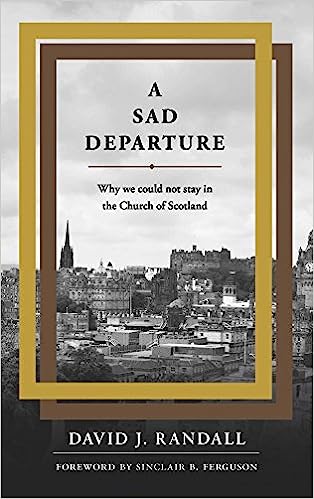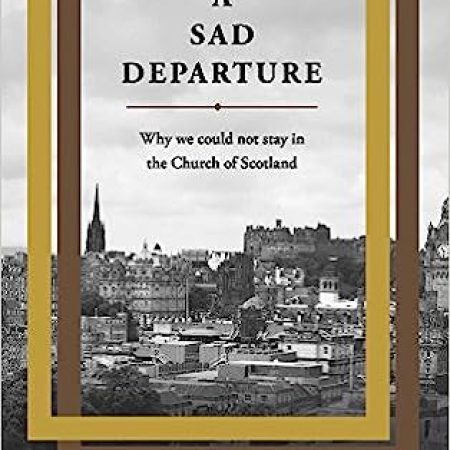
This is a book that frankly you wish didn’t have to be written but which you are glad has been. It became necessary because of the recent developments in the Church of Scotland which have seen the denomination reject the authority of Scripture and its biblical roots and accept the ordination of ministers who are practising homosexuals.
There are few more qualified than David Randall to guide us. David spent 40 years as a Church of Scotland, serving all that period in one parish in the northeast of Scotland. He also served the denomination in a number of capacities so is very familiar with the inner workings of the church. Now retired he has left the denomination in which he ministered for so long, precisely because of the issues he addresses in this extremely readable book
The author sets out to chart the recent and sad history of this once great, reformed denomination that boasted a gospel presence in every town and village of the country. However, in recent years, it has been in freefall numerically, a decline matched only by its spiritual and theological decay.
In what Sinclair Ferguson describes in the foreword as “almost novelesque”, David Randall records how over several recent General Assemblies, the highest court and decision making body in the church moved inexorably towards its current position which places its own authority over that of Scripture. In 2013 they passed the self-contradictory motion that while they “affirm the Church’s historic and current doctrine and practice in relation to human sexuality; nonetheless permit those Kirk Sessions who wish to depart from that doctrine and practice to do so.” A personal friend told me that proposal had been drafted on the back of an envelope over a coffee break and if that isn’t actually factually correct it might as well have been! The 2015 General Assembly officially ratified the right of Kirk Sessions to call as ministers those in same-sex civil partnerships and also opened to door, subject to further discussion, to those in same-sex marriages.
The overall tone of this book is reflected in its title. There is nothing triumphalist in the tone of writing, no ‘holier-than-thou’ judgmentalism; just genuine grief that such a state of affairs has come to pass. In the words of one of the churches who felt constrained to leave, “…if we must leave our church, it should always be with tears – not with drums playing and flags flying.” The author is also at pains not to ‘name and shame’. He refers to job titles and roles within the church but there is no public shaming of the key protagonists in this sorry saga, something I find impressive in this day and age.
This is a book about a hugely significant episode in recent and current Scottish Church history, but it is more than that. As well as giving us the background to these decisions, and a detailed but succinct account of the events as they unfolded, David Randall supplies a very helpful chapter in which he gives an overview of the biblical teaching on the issue at the heart of this controversy – though he is at pains to point out that ultimately this is not a dispute about sexuality but authority – the authority of Scripture.
There is also a very useful chapter with some examples of historical instances of divisions and the lessons to be learned from them. Of particular interest is the closing compilation of testimonies and stories of churches and ministers who have wrestled with the question of whether to leave or not and who have decided that they had no option to do so. This has the effect of humanising the whole business and conveys something of the pain but also the oft mentioned relief of making such a momentous decision.
David Randall has a chapter in the book entitled ‘To Leave or Not to Leave’ in which he weighs up the pros and cons of this most difficult of decisions and explains why he came to the conclusion he did and why others have come to different decisions. While sympathising with the enormity of the choices to be made he carefully and critically evaluates all the other solutions and finds them wanting in the face of a matter of such seriousness. As an observer, in the sense that I am an independent baptist who has many friends in Scottish Presbyterianism, I confess I am puzzled not by how many have left, but how few. The points David Randall makes are, it seems to me, unanswerable. If this isn’t an issue worth seceding over I cannot think of one that is.
This story needed to be told and it needed to be told now, so close to the events themselves, and it needed to be told by someone as close to the church as David Randall. What this book should do is drive us to our knees, to plead with the King and Head of the Church to yet have mercy on the Church of Scotland and lead its leaders to genuine repentance and reformation. There is absolutely nothing to glory in here, except, of course, God’s honouring of and faithfulness to those who have honoured him.
In the words of a letter quoted by David Randall, “…whether it is a nation, a church, or a human heart, God will only honour his truth…we seek not a new church or a broad church or a narrow church or a modern church but a faithful church.” To which all God’s people ought to say, “Amen”
